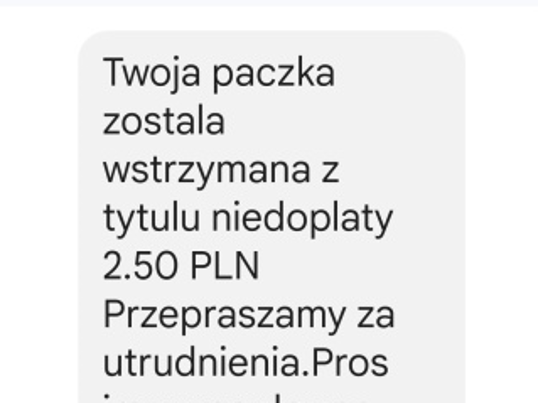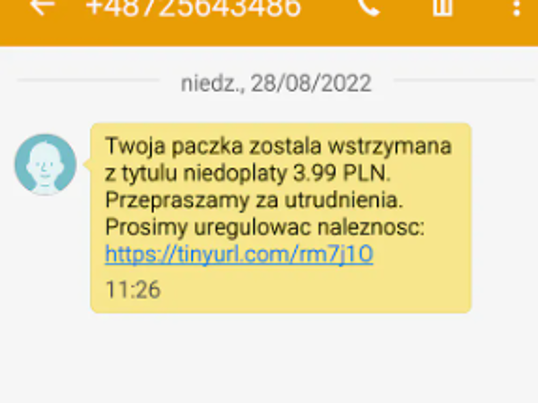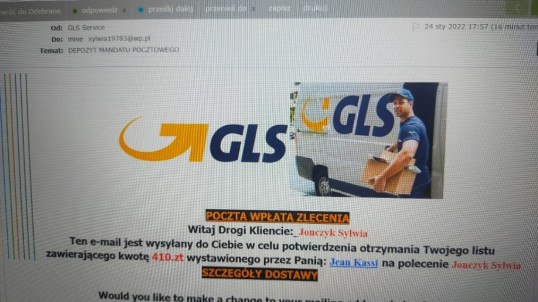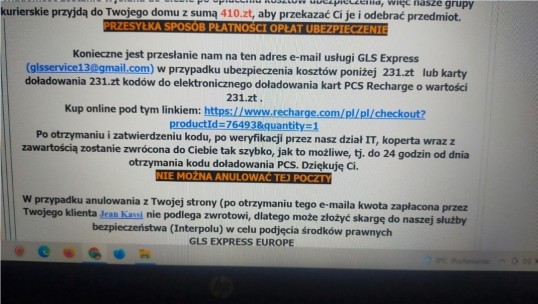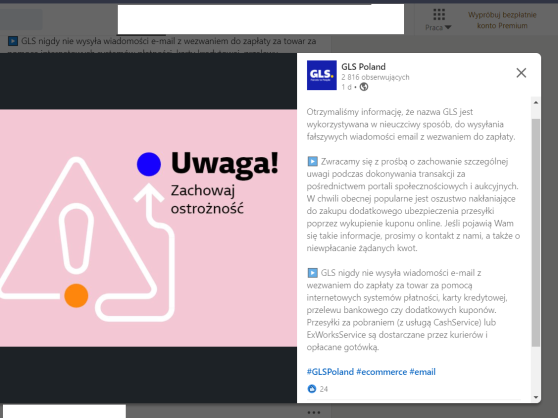Internet scams
Online parcel shipping scams have become increasingly common recently. Criminals are misusing the names and logos of well-known shipping companies, such as GLS, to commit fraud or gain access to sensitive information.
Fake job offers
Job offers for couriers
Recently, we have noticed fake job offers for drivers appearing on the Internet, signed with the name GLS Poland, in which potential candidates are required to send scans of identity documents, i.e. driver's license or ID card, to the supposed employer.
These offers are false and designed to gain access to your personal information. GLS has never required and does not require any scans of such documents to be sent for recruitment purposes.
Moreover, couriers providing services to GLS are employed by transport companies (subcontractors) - GLS does not recruit for driver positions. Therefore, we strongly warn against responding to such advertisements and providing any private data to alleged employees.
Job offers for "parcel agents"
Those ordering goods online and using fake IDs and illegally obtained credit cards in the process have recently been increasingly offering jobs for so-called "parcel agents." The job - usually part-time - involves accepting shipments and redirecting them to another address, often abroad.
The goal is to conceal the destination of fraudulently acquired goods. Police warn against accepting offers to work as a "parcel agent." This supposedly lucrative occupation means engaging in fraud and money laundering, resulting in legal and financial consequences.
Typical examples of online scams
False demands for payment of missing taxes or transportation fees for a GLS shipment or for products transported by GLS
Responding to online sales offers whose shippers claim that a GLS courier will deliver your package only after payment for the service
Recipients of such e-mails should inform GLS immediately and under no circumstances pay the requested amounts. GLS never sends e-mails requesting payment for goods via online payment systems, credit card or bank transfer.
Cash on delivery (with CashService or ExWorksService) shipments are delivered by couriers and paid by cash or BLIK payments.
- You receive a demand for payment and do not know what the payment is for,
- The message contains a demand for urgent payment and includes aggressive phrases such as threats of legal action or destruction of the shipment if you do not respond immediately,
- A message that purports to be related to a GLS shipment, but does not contain a tracking number or the tracking number does not return any results in the tracking available on the GLS website,
- A message you receive on behalf of GLS contains many incorrect words or grammatical errors, logos or images that are of poor quality or clearly different from the usual graphic appearance of a genuine message from GLS.
You should also note that genuine messages or invoices from GLS are never sent from free email service addresses, such as emails ending in gmail.com or Outlook.com.
Some messages may even contain valid personal information, such as a postal address or phone number, usually obtained from previous data leaks not related in any way to GLS.
If you are unsure whether a message you have received is authentic, you can contact us to verify the message and receive further guidance. Remember - if you are contacting us about a suspected scam, never use the contact information provided in the suspicious message or respond to the message.
You can find detailed instructions for reporting suspicious messages in the Knowledge Base on the intranet.
- report to the relevant authorities, in order to prevent so-called, identity theft (e.g., attempts to take out a loan or credit using your personal information),
- set up an account in the credit and economic information system (e.g., Credit Information Bureau: https://www.bik.pl/klienci-indywidualni/alerty-bik ),
- change your password if you use your PESEL number as an authorization to services and services,
- reserve your PESEL number - HERE
- use the service https://www.centralnainformacja.pl/ , which allows you to obtain information about bank accounts established with your personal data,
- monitor payment transactions on your bank account (e.g., set up notifications in the banking application).
You can also report suspicious, link-containing text messages to analysts of NASK's CSIRT (National Level Computer Security Incident Response Team):
- at: https://incydent.cert.pl
- by e-mail: cert@cert.pl
- by SMS: 8080 (forward the entire message in its original form - do not cut the link or parts)
